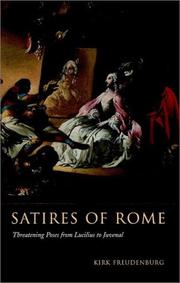Check nearby libraries
Buy this book

This new survey of Roman satire locates its most salient possibilities and effects at the center of every Roman reader's cultural and political self-understanding. This book describes the genre's numerous shifts in focus and tone over several centuries (from Lucilius to Juvenal) not as mere 'generic adjustments' that reflect the personal preferences of its authors, but as separate chapters in a special, generically encoded story of Rome's lost, and much lionized, Republican identity. Freedom exists in performance in ancient Rome: it is a 'spoken' entity. As a result, satire's programmatic shifts, from 'open' to 'understated' to 'cryptic' and so on, can never be purely 'literary' and 'apolitical' in focus and/or tone. In Satires of Rome, Professor Freudenburg reads these shifts as the genre's unique way of staging and agonizing over a crisis in Roman identity. Satire's standard 'genre question' in this book becomes a question of the Roman self.
Check nearby libraries
Buy this book

| Edition | Availability |
|---|---|
|
1
Satires of Rome: threatening poses from Lucilius to Juvenal
2001, Cambridge University Press
in English
0521803578 9780521803571
|
aaaa
|
| 2 |
zzzz
|
Book Details
Table of Contents
Edition Notes
Includes bibliographical references (p. 278-284) and index.
Classifications
External Links
The Physical Object
ID Numbers
Community Reviews (0)
History
- Created April 1, 2008
- 13 revisions
Wikipedia citation
×CloseCopy and paste this code into your Wikipedia page. Need help?
| November 14, 2023 | Edited by MARC Bot | import existing book |
| January 14, 2023 | Edited by ImportBot | import existing book |
| January 10, 2023 | Edited by ImportBot | import existing book |
| December 3, 2020 | Edited by MARC Bot | import existing book |
| April 1, 2008 | Created by an anonymous user | Imported from Scriblio MARC record |









